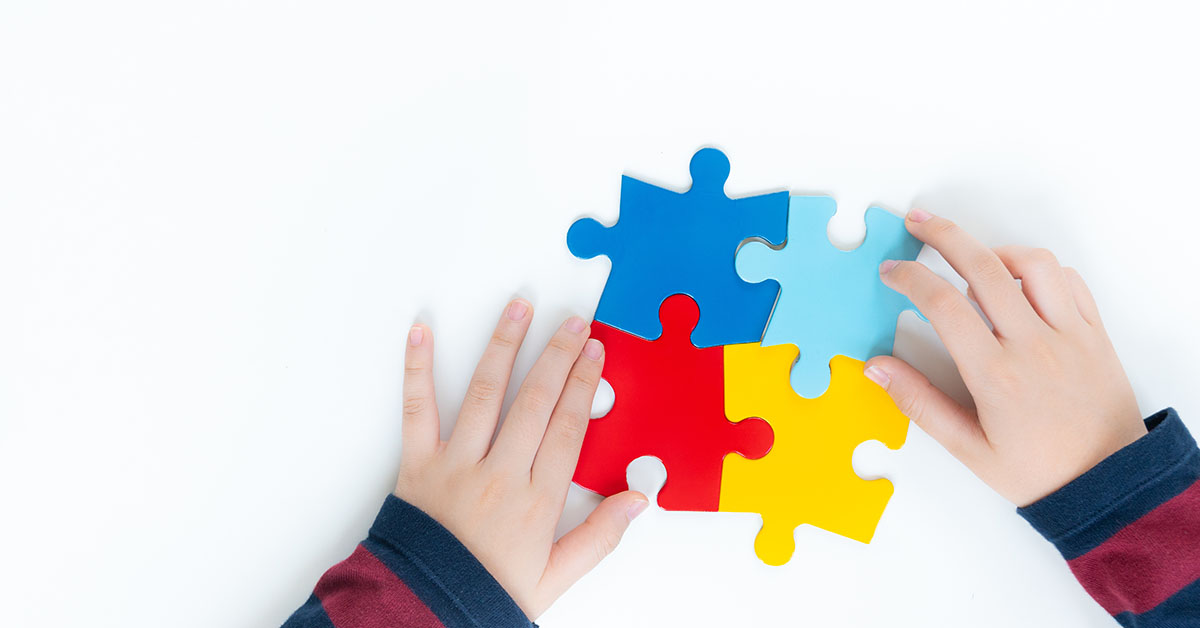 Kernodle Clinic - A DukeMedicine PRACTICE
Kernodle Clinic - A DukeMedicine PRACTICE
- Burlington 336-538-1234
- Mebane 919-563-2500
- Elon Family 336-538-2314
- Elon Pediatrics 336-538-2416
What are the Early Signs of Autism?

April is National Autism Awareness Month, so we are joining the Autism Society in raising awareness about autism spectrum disorder. The goal is to educate the public and foster a greater understanding and empathy for the children and families ASD affects.
According to the American Academy of Pediatrics (AAP), autism spectrum disorder (sometimes simply referred to as autism) affects about 1 in 54 children. The AAP recommends that all children be screened for autism spectrum disorder (ASD) at their 18 and 24-month checkups.
Signs of Autism at Any Age
There are signs of autism associated with certain ages. This list includes some signs of autism that may occur at any time. Some are included in the list of early signs of autism later on, while others apply to children older than 24 months old.
Social Differences
- Poor or no eye contact
- Does not look at things others are looking at or pointing to
- Does not respond to others’ facial expressions
- Persistent preference for solitude
- Disinterest in making friends
- No concern or empathy for others
- Loss of previously acquired social skills
Communication Differences
- Delayed language development
- Loss of previously acquired speech
- No response to their name being called
- Does not start conversations
- Has trouble continuing conversations
- Repeats things others say without understanding the meaning (parroting or echoing)
- Shows no interest in communicating
Behavioral Differences
- Resistance to even minor changes in routine or surroundings
- Intense or unusual reactions to stimuli (sensory sensitivities)i:
- Sounds
- Textures
- Lights
- Colors
- Smells
- Tastes
- Repetitive behavior or “ticks”
- Rocking
- Spinning
- Hand flapping
- Walking on tips of toes
- Ritualistic behavior
- Obsession with very specific activities that they repeat throughout the day
- Looks at people or objects from odd angles
- Lack of pain response
Early Signs of Autism By Age
There is no set age for when the signs of autism start. According to Autism Speaks, some babies show hints of ASD in the first few months while other children don’t show signs until as late as 2 or 3 years old. However, there are age-based milestones that might indicate that a child might be at risk for an autism spectrum disorder. But it’s always important to keep in mind that every child is different. Not all children show all early signs of autism. Only a professional evaluation can determine if a child has an autism spectrum disorder.
0 – 6 Months
One of the early signs of autism is when a baby does not smile often or at all by 6 months old. They don’t have joyful, warm, or engaging expressions. A child with typical development will respond and interact when you speak to them, but a child with ASD may not.
6 – 9 Months
At this age, most children will readily engage in back-and-forth gestures and sounds. They like to respond to smiles or other facial expressions. Children with autism will not participate in this back-and-forth much if at all.
9 – 12 Months
At 12 months, a child with ASD will exhibit little or no babbling or “baby talk.” They don’t respond to gestures like pointing, showing, or reaching. They do not participate in back and forth exchanges like waving.
By 12 months old, most children will respond or turn their heads when they hear their names. If a child with autism may not turn to look at you when their name is called, even if you call them several times. However, they will respond to other sounds, so their ability to hear is not in question.
12 – 16 Months
At 16 months old, children with typical development will be saying new words. Their vocabulary will be expanding to 7 or more words they can say clearly. They will still rely on gesturing and other nonverbal communication, but the building blocks are starting to form.
Children with autism are only able to say a few words. Some may not say any words at all.
16 – 24 Months
Children with early signs of autism will not be speaking the way other children do by 24 months. Children of this age usually have a collection of two-word phrases or sentences they can say to communicate with others. Children with autism spectrum disorder will only have a couple of those phrases if they have any at all. This does not include repeating what others say without knowing what they mean. This is called parroting or echoing and is also one of the early signs of autism.
At Kernodle Pediatrics, we are dedicated to providing the best care possible for your child. If you have questions about the early signs of autism or autism screening, call us at (336) 538-2416 to make an appointment.
